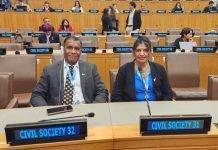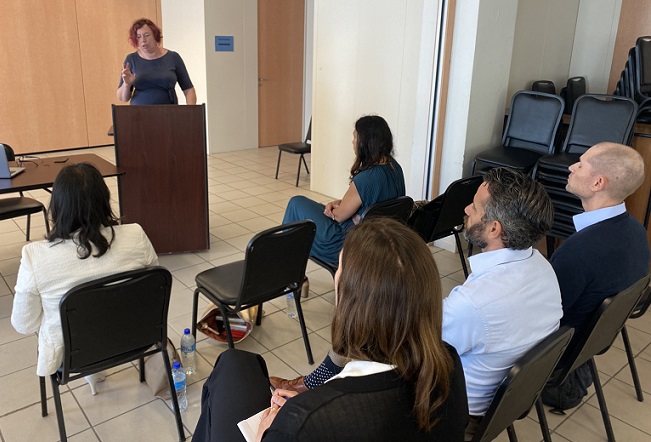Philipsburg – The Department of Legal Affairs & Legislation organized a two-part lecture on: “The Role of Small Island Developing States in the Formation of Fair Taxation as Customary Law” and another on: “Development in EU-OCT Relations for St. Maarten.”
These topics are important because there are issues that affects and influences and impacts the country and its citizens.
“Before Covid-19, the Department of Legal Affairs & Legislation organized 3-4 times per year a lecture about a legal topic on the Legal Platform. The reason for this lecture is to provide policy officers/policy advisors/legal advisors/lawyers information about legal topics,” said Ramona Ismail, Legal Policy Advisor of the department.
The two lectures were Professor Dr. Flora Goudappel and Germaine Rekwest, both of the University of Curacao.
Dr. Goudappel spoke about the relation and the development of the European Union and the Netherlands and St. Maarten, as OCTs, Overseas Countries and Territories. Indicating that there are several aspects to the relationship, from the environmental to the social to the trade and development.
St. Maarten can benefit more and take advantage of the opportunities as a member to the EU, which ranges from having access to the European market to applying for EU funds to develop social and environmental projects. There is more to being a partner in this partnership, Dr. Goudappel said. A professor of European law and dean of the Faculty of Law at the University of Curaçao, Goudappel specializes in the relation of the overseas countries and territories to the European Union.
There is a new instrument, Prof. Dr. Goudappel said, the Decision on the Overseas Association underpinning the political/institutional, trade and financial cooperation framework for the EU-OCT partnership for 2021-27. The new Decision on the Overseas Association unifies the rules for the partnership with all Overseas Countries and territories (OCTs), which St. Maarten and other OCTs can take advantage of.
With an ever-changing world, from 25 OCTs down to 12, there are many changes that’s happening in this developing world. The aim of the new regulations are to strengthening competitiveness, increasing resilience and reducing vulnerability, and promoting cooperation and integration between the OCTs and other partners and neighboring regions. In addition, there are financing options with regard to Disaster Risk Reduction, Multiannual program funding, and emphasis on UN 2030 Agenda and Environmental Protection.
The other speaker was Germaine Rekwest (LL.M) who provided information on the concept of Fair Taxation as it relates to an international standard and contextually to global developments, as well as exploring the topic of Fair Taxation, from the different angles—economic, legal/judicial, political, and philosophical.
The central question in this lecture is whether the implementation of Fair taxation by the Small Island Developing States (SIDS) contributes to the formation of Fair taxation as a principle of customary international law, said Rekwest, who is a researcher and lecturer in tax law at the University of Curaçao and is currently finalizing her PhD at Leiden University.
The Government is dealing with (the implementation of) international tax standards, so it is relevant for civil servants to learn more about this. The same applies to the new OCT decision. In addition, there has to be the considerations for not complying with certain EU stipulations as it regards this topic of fair Taxation.
The Department JZ&W is very thankful that Professor Dr. Flora Goudappel and Germaine Rekwest (LL.M) have given the lecture on the Legal Platform.





























